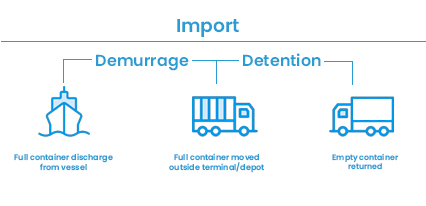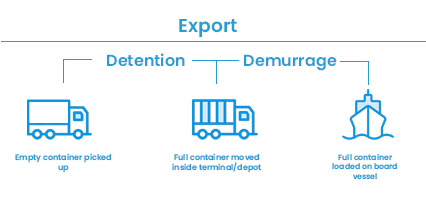Demurrage and Detention
By: Explect, June 9, 2022

It is common for people to perceive the daily charges for demurrage and detention as unjustified and unreasonable, but it is essential to understand that shipping companies utilize these charges to ensure the efficient use of their containers. These fees were once rare, but they are now prevalent and can easily exceed €100 per container per day.
Despite the frustration that can come with demurrage and detention charges, it is crucial to recognize that these charges serve two primary purposes. The first purpose is to compensate the shipping company for the use of their container, while the second is to encourage traders to return the empty container promptly and ensure a quick turnaround time.
To clarify, demurrage and detention fees apply when a shipper fails to return the containers of a carrier or shipping line within the allotted free days. The number of free days granted determines the duration a shipper can utilize the container without incurring any fees. When the free days are exceeded, the shipper must pay demurrage and detention fees, which are usually calculated per day until the containers are delivered to their assigned destination.

Demurrage and Detention fees can be confusing and frustrating for shippers. Demurrage is the charge for the time a container stays in the terminal, while Detention is the fee for prolonged use of the container beyond the free days until it is returned empty to the shipping line. If the container is not removed from the terminal for unpacking within the free days, Demurrage charges come into play.
Free days for conventional shipments are usually between 3-5 days after the container is discharged from the vessel. Storage charges are applied to the container until it is picked up and gated out of the terminal. Demurrage fees must be paid before the cargo can be collected from the port.
Detention fees apply when the container is picked up but not returned to the carrier. If the consignee holds the carrier's container for longer than the allowed free days, Detention fees are imposed. The goal of Demurrage costs is to shorten the turnaround time of the container and make shipments more efficient.
Shippers need to be aware of these charges and their implications. Failure to return containers on time can result in significant additional fees, which can quickly add up. Therefore, shippers should plan their operations accordingly to avoid unnecessary costs and ensure prompt delivery of the containers to their designated destination.

What are the Demurrage and Detention costs when exporting?
When exporting goods via containers, you will encounter Demurrage and Detention costs. Demurrage costs arise when the container is with the shipping line but cannot be loaded onto the vessel. The reason for this could be a lack of documentation or other non-provider-related errors. In these cases, the carrier cannot load the container onto the scheduled vessel, and it has to remain in the port until the next scheduled vessel. The costs are then applied to the storage period until the next planned vessel. Detention fees are also charged when exporting containers. Users are charged detention fees when an empty container is picked up to be loaded and is not returned within the stipulated free days. Shipping lines usually provide five free days to pick up, load, and return the container full to the port. Detention fees are charged for the additional days before the container returns to the terminal.
What is the difference between Demurrage and Port Storage Charges?
Port storage charges are levied by the port for containers that are not transported out of the port within the free days, affecting yard space and port productivity. Typically, each port offers a certain free period of between 3–7 days to process import requirements and pick up the container from the port. In some countries, these costs can become quite high if consignees cannot pick up their goods due to financial, documentary, or contractual problems. Once the consignee has exceeded the allowed free days, the containers impact yard space, port productivity, and congestion, and the fees come into play. To encourage importers to clear cargoes on time and pick up containers, ports impose these storage charges. Port storage charges are charged for full containers that have not been cleared for import, full containers that must be shipped for export, or empty containers within the port. Different terminals offer varying free days, but the charges usually circulate throughout the port, resulting in a similar level of fees valid for one year. The charge is collected directly by the port or through the shipping line, as shipping lines sometimes move containers to a private depot to avoid storage fees for the customer.
What causes these costs?
Demurrage costs generally arise due to poor planning or unforeseen circumstances, including the role played by mega-ships that flood container terminals. Additionally, incorrect or lost documents are common causes. Therefore, it is important to be on time and prepared, especially with all the documentation required to transport cargo from point A to point B.
How we can help you with your logistics needs?
At Explect Online, we provide you with smart solutions to solve your logistics problems. Our digital platform makes it easy for you to organize your logistics 24/7. After booking, we offer end-to-end visibility from origin to destination, communicate through a ticket system to avoid long email chains, and provide an easy-to-follow task list to keep your shipment moving.
You'll take care of the necessary documentation, and we'll handle the rest!
Read more about Explect Online
Are you leaving the website already?
Didn't find what you were looking for?
We are happy to help you, ask your question below
